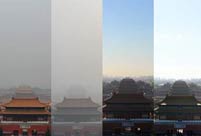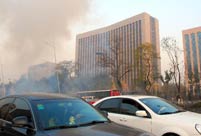 |
Experimental project in Shanghai could herald the take-off of next round of economic reforms, Andrew Moody reports
Acollection of warehouse developments facing the breeze of the East China Sea might seem an unlikely symbol of China's future.
The Waigaoqiao Free Trade Zone in the north east of Shanghai's Pudong district and set up as a bonded zone in the 1990s, is one of four areas designated to be the China (Shanghai) Pilot Free Trade Zone.
The FTZ, which consists of just 29 sq km, could be the most important economic reform in China since the establishment of the Shenzhen special economic zone in the early 1980s, which paved the way to China becoming the manufacturing workshop of the world.
This time, however, the FTZ is not about manufacturing but the opening up of China's service sector — and, in particular, financial services, to the rest of the world.
It could herald Shanghai eventually becoming a global financial hub, with top Chinese banks, such as Bank of China, competing with Wall Street giants such as JPMorgan Chase and also lead to the yuan becoming a major international reserve currency.
All this was still in the future when the FTZ, the territory of which also includes the Pudong Airport Free Trade Zone, Yangshan Free Trade Port area and the Waigaoqiao Free Trade Logistics Park, was officially launched at the end of September.
For now it is just a three-year pilot and a testing of the water as to how certain key reforms would work if they were introduced across China as a whole.
Chief among these are interest rate liberalization (giving banks the freedom to set their own interest rates and able to compete for deposits as opposed to them being centrally set as in the rest of China) and greater yuan convertibility than the current tight foreign exchange restrictions allow.
Businesses in 18 key areas will be allowed to operate in the zone, including banking, legal services, travel agencies, human resource consultancies, medical services and even foreign businesses offering entertainment venues and those producing and selling gaming consoles.
There has been much focus so far on the "negative list" on what will not be allowed in the zone, including gambling businesses, golf courses and any businesses auctioning off cultural relics or involved in pornography.
Thousands of domestic businesses have already tried to register in the zone with the FTZ service center receiving some 500 enquiries a day.
Citibank and DBS are so far the largest foreign financial institutions to announce establishing sub-branches in the zone. Many others are expected to announce their involvement.
Over at her sixth floor offices in Pudong New Area, Jane Wang, tax partner at business advisers PwC China, says she has been inundated by requests from clients for advice.
"It has been overwhelming. It is a really big topic at the moment. Everyone is looking at it and trying to understand the details and the background and what kind of policy the government will issue in the future," she says.
It is the detail that everyone is waiting for. Many are expecting further announcements after the Third Plenary Session of the 18th Communist Party of China Central Committee, which begins on Nov 9.
Long Guoqiang, director-general of the General Office of the Development Research Center of the State Council, said last month the government would be "prudent" in implementing policies.
"The Shanghai FTZ will be the pilot and explorer of China's economic upgrading," he said.
A key question remains as to the extent of the convertibility of the yuan within the zone. Currently in the rest of China companies wanting to change large amounts of the Chinese currency have to apply to the State Administration of Foreign Exchange. Chinese citizens can individually exchange $50,000 of yuan in any one year. There is no problem with currency transactions if they are for the trade of physical exports and imports. The restrictions apply to currency trades on their own. What is not known at present is what limits, if any, will apply in the FTZ area.
The other major uncertainty is to what extent the banks, foreign and domestic, will be able to compete with each other by setting their own interest rates. It is assumed they will only be able to offer financial services to those companies registered within the FTZ.
One of the major challenges for those setting the framework for the establishment of the zone is preserving a border between the FTZ and the rest of China and reducing the risk of any arbitraging opportunities.
May Yan, a banking analyst for Barclays Capital in Hong Kong, says it is far easier to place a border around a zone where goods are manufactured than one that applies to services and, in particular, the movement of money.
"You can actually control physical goods. There is only so much you can actually smuggle but finance is just numbers in a computer that can be switched very quickly. The wiring of money is so easy."
The "general plan" for the zone states the convertibility under the capital account will be introduced gradually through a series of trial programs as will market-orientated interest rates.
He Weiwen, co-director of the China-US/EU Study Center at the China Association of International Trade in Beijing, says the authorities are being understandably cautious.
"In the broad master plan of the free trade zone the wording referred to the full convertibility of the yuan. In the State Council's notice this wording was removed because it might be too early to say that. However, the currency will have to be convertible within the capital account, or the free trade zone will have no meaning," he says.
Simon Gleave, regional head of financial services for KPMG Asia-Pacific, based in Beijing, says the problem for the authorities is that they are attempting something completely new.
"No country has tried to open up and deregulate at this stage of its development and when it is of the scale that China is now. It is already the world's second-largest economy so to try and create a convertible currency in one go is a very big ask and a very big unknown in terms of the effect it might have," he says.
"The implications for the rest of the world of getting it wrong are quite important. That is why it is important to use some sort of pilot area which is already in the center of China's capital markets."
One of the aims of the planners is to make the FTZ attractive to multinationals and the hope is that a number of them will make the zone their Asia headquarters. Many multinationals now do the majority of their Asia business on the Chinese mainland but have their base in Singapore or Hong Kong. This involves a lot of unnecessary travel for many senior executives visiting their operations in the world's second-largest economy.
The reason why they do this is because under the current currency conversion rules they would not be able to transfer money between their various Asia locations and their headquarters, if it was in China.
If these currency restrictions were removed, it would make no difference if the headquarters were in the FTZ, Singapore or elsewhere. Money could flow freely in and out of the zone. The problem of getting money out of the rest of China would remain for the zone-based company but it would be at no disadvantage to a company based elsewhere in Asia.
He at the China-US/EU Study Center at the China Association of International Trade believes it is not clear yet whether multinationals will move to the zone.
"Most companies have their manufacturing or research and development base. To have a regional headquarters in China, you need to be able to do international settlements. This is a step in the right direction but it is too early to say."

 Luxury-cars parade held in Dubai
Luxury-cars parade held in Dubai Special forces take tough training sessions
Special forces take tough training sessions Fire guts 22-storey Nigeria commercial building in Lagos
Fire guts 22-storey Nigeria commercial building in Lagos A girl takes care of paralyzed father for 10 years
A girl takes care of paralyzed father for 10 years A record of Beijing air quality change
A record of Beijing air quality change In pictures: explosions occur in Taiyuan
In pictures: explosions occur in Taiyuan Hello! Horror Halloween Celebration!
Hello! Horror Halloween Celebration!  The catwalk to the world of fashion
The catwalk to the world of fashion  Cruise trip to Taiwan
Cruise trip to Taiwan  Maritime counter-terrorism drill
Maritime counter-terrorism drill Loyal dog waits for master for six months
Loyal dog waits for master for six months Oriental education or western education?
Oriental education or western education? China in autumn: Kingdom of red and golden
China in autumn: Kingdom of red and golden National Geographic Traveler Photo Contest
National Geographic Traveler Photo Contest Chinese screen goddesses from Beijing Film Academy
Chinese screen goddesses from Beijing Film Academy Day|Week|Month